What to Know
Bichon Frise Lifespan
Bichon Frise is a small, fluffy dog breed known for its friendly nature and adorable appearance. These charming canines are popular companions for individuals and families alike, as they are known for their sociable and affectionate temperament. A key factor to consider when acquiring a Bichon Frise is their lifespan and how to ensure that they live a long, healthy life.
To understand the Bichon Frise’s life expectancy, it’s essential to be aware of their characteristics and potential health concerns. These small dogs, weighing between 10-20 pounds, generally enjoy a lifespan of around 14-16 years.
With proper care, some may even live up to 20 years. The breed is relatively healthy, but they can be prone to particular health issues, which can be managed with regular vet checkups, a balanced diet, and an active lifestyle.
Key Takeaways
- Bichon Frise typically has a lifespan of 14-16 years, with some living up to 20 years.
- Regular vet checkups, a balanced diet, and an active lifestyle help maintain their health.
- Be mindful of potential health issues specific to the breed to ensure a long and happy life.
History and Origins
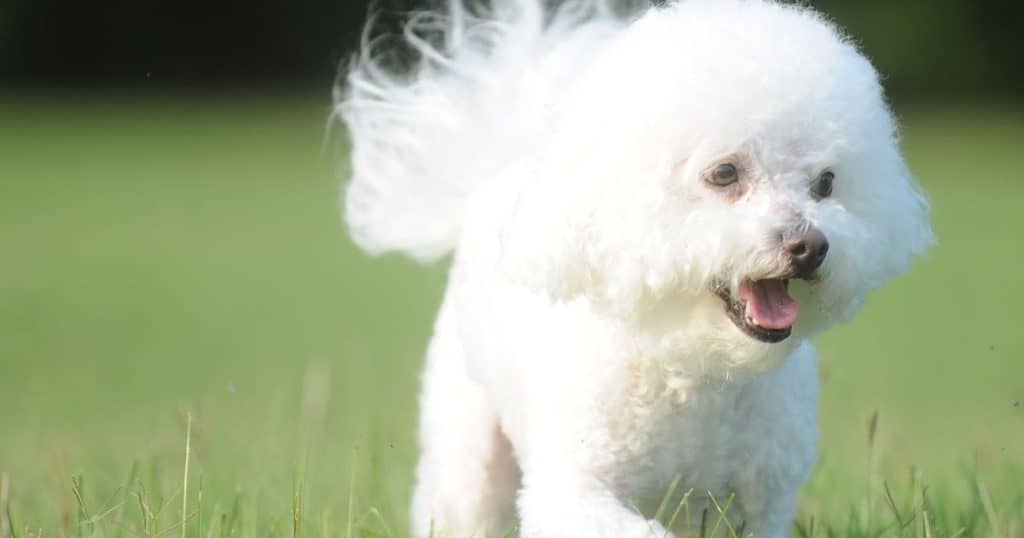
Breed’s Heritage
The history and origins of the Bichon Frise can be traced back to the Mediterranean region, being closely linked with breeds such as the Maltese and Bolognese. Thought to have been introduced to Tenerife in the Canary Islands by Spanish seamen, the early breed found success and gained the attention of European nobility during the 13th century, becoming popular in the royal courts of Spain, Italy, and France 1.
As a member of the AKC’s non-sporting group, the Bichon Frise gained recognition for its fluffy coat and cheerful disposition. According to the Bichon Frise Club of America, the breed’s history is a mix of fact, fiction, legend, and conjecture, without specific dates or descriptions2. However, their undeniable charm and intelligence have helped them survive and thrive.
In modern times, the Bichon Frise has gained popularity as a companion pet, known for its playful nature and adaptability to different living environments. I have observed that their fluffy white coat requires regular grooming to maintain its appearance, but their small size makes them suitable for apartment living and for owners with limited space. It’s worth noting that the average Bichon Frise lifespan is between 14 to 15 years, with genetics and quality care playing crucial roles in determining their health3.
As a breed with a rich heritage and a long history of adapting to various environments, the Bichon Frise has undoubtedly left its mark on the hearts of dog lovers around the world. As we continue learning more about their origins and care, we can ensure that these adorable dogs will continue spreading joy and companionship to those who welcome them into their homes.
Footnotes
Bichon Frise Characteristics
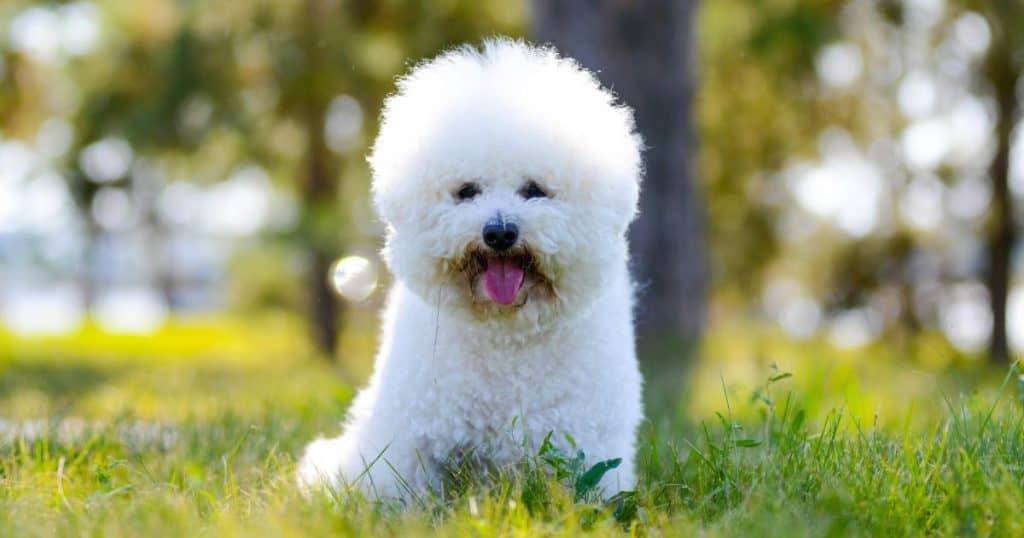
Physical Features
The Bichon Frise is a small, adorable dog breed known for its fluffy, white coat and charming appearance. Adults typically stand at a height of around 9.5-11.5 inches and weigh between 12-18 pounds. Their distinctive coat is hypoallergenic, making them a popular choice for people with allergies. Unlike many other breeds, the Bichon Frise is low shedding which can be a relief for pet owners who don’t want to find fur all over their home.
Temperament and Behavior
Beyond their elegance and delightful appearance, Bichon Frises are also known for their friendly and affectionate temperament. They are intelligent and curious creatures, always eager to explore their surroundings and learn new tricks. This breed has a well-deserved reputation for being sociable, making them great companions for families and individuals alike.
Their charming personality and cheerful demeanor make the Bichon Frise a beloved family pet. They enjoy being the center of attention and can be quite entertaining with their playful and sometimes silly antics. Despite their small size, they are relatively energetic and require regular exercise to maintain their health and happiness.
In conclusion, the Bichon Frise is a delightful dog breed that is loved for its physical features and endearing temperament. The combination of their hypoallergenic coat, low shedding nature, and delightful disposition makes them wonderful companions for dog lovers of all ages.
Bichon Frise Lifestyle
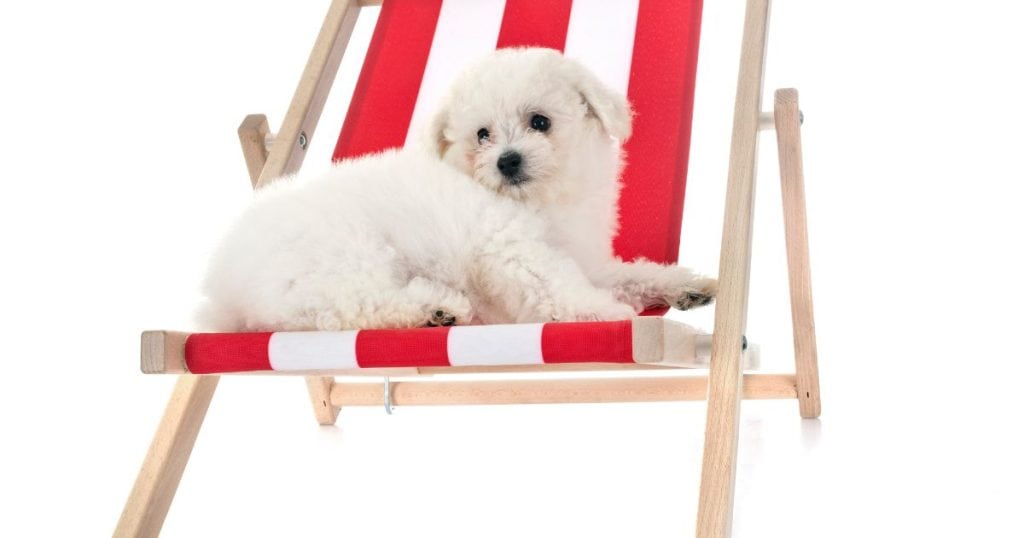
Environment and Exercise
As a Bichon Frise owner, I understand the importance of providing an appropriate environment and exercise routine for my beloved pet. Bichon Frises are a small breed, which makes them well-suited for living in apartments or smaller homes. They don’t require a large yard, but they do need a safe space to play and explore.
Exercise is crucial for the physical and mental well-being of your Bichon Frise. In order to maintain a healthy weight and keep their minds stimulated, Bichons should receive at least 30 minutes of daily exercise. This can include playtime, walks, or even agility training. Due to their intelligence and curiosity, providing them with puzzle toys or interactive games can also be beneficial.
Socialization and Training
Bichon Frises are known for their friendly and affectionate nature. They’re particularly good with children and generally get along well with other pets. However, it’s important to socialize them early in life to ensure they grow up to be well-rounded and confident dogs. Introducing your Bichon Frise to new people, animals, and environments can have a positive impact on their socialization.
These small, sociable dogs are quite trainable due to their intelligence and eagerness to please their owners. Bichon Frises excel in obedience training and are known to perform well in agility and other dog sports. Their intelligence, combined with their love for playtime and exercise, makes them willing participants in training activities.
Using positive reinforcement techniques during training sessions can help make the process fun and enjoyable for both you and your Bichon Frise. Just remember, patience and consistency are key when training any dog. With the right approach and dedication, your Bichon Frise can flourish in its environment, fully enjoying its playtime and interacting positively with the whole family.
Bichon Frise Health and Lifespan

General Health
As a Bichon Frise owner, it’s essential to be mindful of their overall health to ensure their longevity. The average Bichon Frise lives between 14 to 16 years, with some even reaching 20 years depending on their health and care. Providing quality care includes regular vet visits, a healthy diet, exercise, and proper grooming.
Common Health Conditions
While Bichon Frises are generally healthy, they can still face certain health conditions. Some common issues these dogs experience include:
- Diabetes: Bichon Frises are overrepresented for diabetes mellitus, a disease of the pancreas that affects blood sugar regulation.
- Cataracts: These dogs may develop eye problems such as cataracts and corneal dystrophy, so routine eye exams are vital.
- Osteoarthritis: As they age, joint stiffness and arthritis can become more common in Bichon Frises. Supplements and regular exercise can help maintain joint health.
- Ear Infections: Bichon Frises are prone to ear infections, so routine ear cleaning is necessary to prevent problems.
- Bladder Stones: These small, hard masses can form in the urinary tract, causing discomfort and potential complications if not addressed.
- Elbow Dysplasia: This developmental issue in the elbow joint can lead to arthritis and pain.
- Cancer: Though less common, Bichon Frises can develop certain types of cancer, making regular vet visits essential for early detection and treatment.
- Liver Shunts: A congenital condition that diverts blood flow from the liver, which can lead to a buildup of toxins in the body if untreated.
Life Stages and Aging
Throughout a Bichon Frise’s life, they’ll pass through several stages, each with its own unique healthcare needs:
- Puppy: During this stage, puppies need vaccinations, deworming, and a balanced diet for proper growth and development.
- Adolescent: As they mature, Bichon Frises need regular exercise, mental stimulation, and continued socialization.
- Adult: Adults require routine vet visits, dental care, grooming, and monitoring for any health changes.
- Senior: Bichon Frises entering their golden years may need more frequent vet visits, joint health support, and a diet tailored to their changing needs.
By providing proper care, monitoring their health, and addressing any health conditions, you can help your Bichon Frise maintain a healthy and happy life, maximizing their lifespan.
Bichon Frise Nutrition
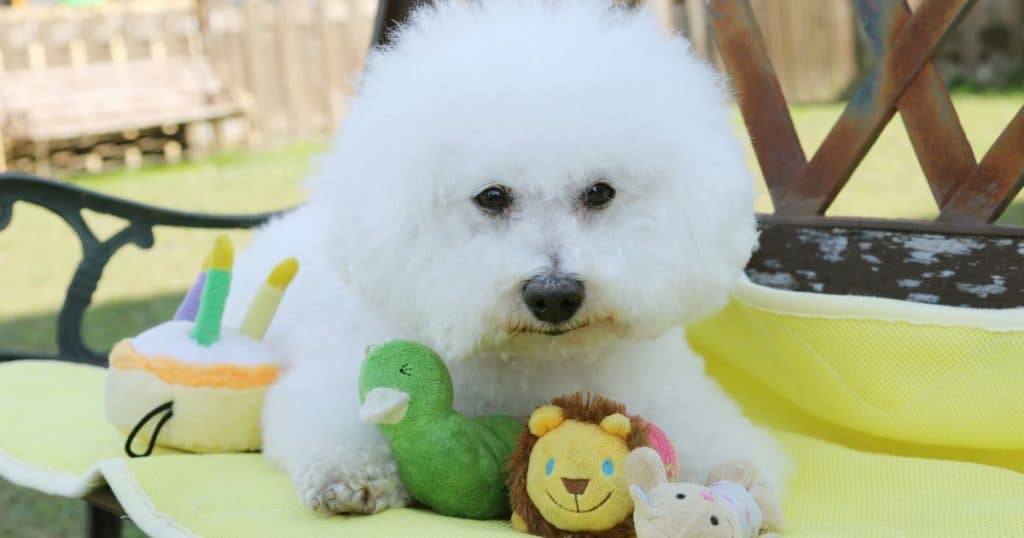
Diet and Feeding
As a Bichon Frise owner, I understand the importance of providing my dog with a balanced and nutritious diet to ensure they live a long and healthy life. Bichon Frises thrive on diets that are composed of high-quality proteins, vitamins, minerals, and a moderate amount of fat. Typically, vegetables are also a great source of nutrients for these small dogs.
When it comes to feeding your Bichon Frise, it’s essential to consider their activity level, age, and overall health. For my dog, I have found that feeding them twice a day – morning and evening – works best to maintain consistent energy and avoid overeating. However, it’s important to consult with your veterinarian to determine the optimal feeding schedule and portion sizes for your specific dog.
Nutrition and Obesity
Bichon Frises, like other small breeds, can be prone to obesity if not given the right diet and exercise regimen. While I ensure that my Bichon Frise receives all the necessary nutrients from their meals, I also pay close attention to calorie intake to prevent unwanted weight gain. Monitoring my dog’s calorie intake is important to maintain a healthy weight, as obesity can reduce their lifespan and lead to health complications.
To maintain a balanced diet for my Bichon Frise, I ensure high-quality protein sources, such as lean meats and fish, make up a significant portion of their meals. I also include vegetables and fruits that are rich in vitamins and minerals to support their overall health.
Here are some essential nutrients to consider for a Bichon Frise’s diet:
- Protein: A vital building block for healthy muscles, skin, and coat. Include lean meats like chicken, turkey, and fish in their meals.
- Fats: Moderate amounts of healthy fats are necessary for energy and to support overall health. Good sources include fish oil and flaxseed.
- Vitamins and minerals: Essential for the overall well-being of your Bichon Frise, vitamins and minerals support various bodily functions. Fruits, vegetables, and dog-safe supplements can provide these nutrients.
To prevent obesity in my Bichon Frise, I also make sure they get regular exercise through daily walks and playtime. A healthy lifestyle, combined with a balanced and nutritious diet, is the key to ensuring a long and happy life for these lovable dogs.
Bichon Frise Grooming
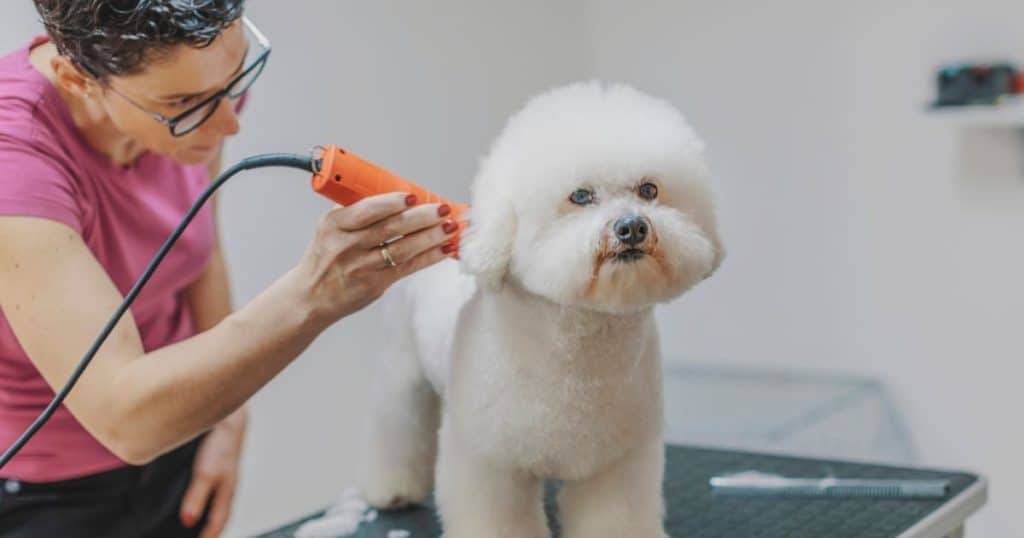
One essential aspect of maintaining the health and well-being of your Bichon Frise is proper grooming. Grooming involves not only taking care of their coat but also their teeth. In this section, we will discuss grooming techniques that will help keep your Bichon Frise healthy, happy, and looking their best.
Teeth and Coat Care
A well-groomed Bichon Frise is a healthier and happier pet. Taking care of their teeth and coat requires regular maintenance and attention. Here are some essential steps for proper teeth and coat care:
- Teeth care: Regular dental care is crucial for the overall health of your Bichon Frise. To ensure proper dental hygiene, use a toothbrush and toothpaste designed specifically for dogs. Establish a routine of brushing their teeth at least two to three times a week. This will help prevent gum disease, bad breath, and other dental issues.
- Coat care: Bichon Frises have a unique coat that requires special care. To maintain a healthy coat, you should brush it daily with a pin brush or soft slicker brush. Regular brushing helps prevent matting and keeps their coat clean and fluffy. It’s also essential to use a high-quality, hypo-allergenic dog shampoo when bathing your Bichon Frise. Bathing them at least once a month will help keep their coat in optimal condition.
If you start grooming your Bichon Frise from an early age, they will become familiar with the process, making it easier for both you and your pet. The more comfortable your dog is with grooming, the easier it will be to maintain their teeth and coat, contributing to a longer and healthier bichon frise lifespan.
Remember, proper grooming is an essential aspect of pet care that contributes to a happy and healthy life for your Bichon Frise. By following these steps and maintaining regular teeth and coat care, you can ensure that your beloved pet enjoys a longer, healthier, and happier life.
Choosing a Bichon Frise
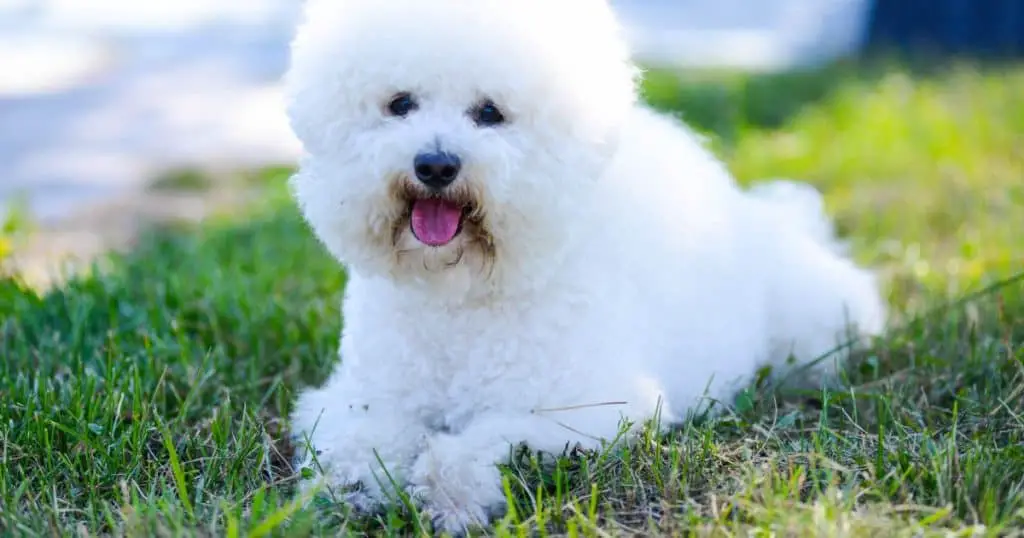
Puppy to Adult
When considering a Bichon Frise puppy, it’s essential to select a reputable breeder. This helps ensure that your puppy has a healthy genetic makeup and has received proper care during its crucial development stages. As a Bichon Frise puppy grows, it undergoes several developmental changes, and a reputable breeder can guide you through these stages. Puppies generally transition to adulthood after one year. During this period, it is essential to provide the right nutrition, exercise, and training to foster their growth.
Factors such as sex and genetics play a role in the development and eventual bichon frise lifespan, which typically ranges from 12 to 15 years. However, some Bichons may live up to 20 years if they have a healthy ancestry and maintain a balanced lifestyle.
Considering Other Breeds
Before settling on a Bichon Frise, it’s wise to explore other breeds and understand their unique characteristics. Some breeds may be more suitable for your lifestyle, preferences, or family situation. For instance, if you’re looking for a more prominent breed, the Bichon Frise might not be the best fit, as they are small and fluffy dogs.
In summary, researching other breeds and understanding the factors that influence a Bichon Frise’s development can help you make an informed decision. This will ultimately support your future furry friend’s healthy and fulfilling life, adding value to yours in return.
Before You Go
Bichon Frise is a small and delightful companion dog breed, known for their charming and elegant looks. A key factor for pet owners to consider is their lifespan, and the Bichon Frise has a relatively long one. On average, they live between 12 to 15 years, with some even reaching 20 years of age ^1^.
Health plays a vital role in determining the lifespan of a Bichon Frise. Regular veterinary care, a balanced diet, and consistent exercise can contribute to their longevity and well-being ^2^. Early detection of potential health issues is crucial, as it can often lead to more effective treatment options, ultimately prolonging their life.
In managing a Bichon Frise’s health and well-being, it is essential to provide an enriching environment and proper care. This means selecting a reputable breeder, attending regular vet check-ups, and ensuring a healthy lifestyle with proper nutrition and exercise. Doing so can increase the chances of your Bichon Frise reaching or even exceeding their average lifespan ^3^.
In my experience, Bichon Frises have been an absolute joy to have as pets. Their lively and affectionate nature, coupled with their impressive lifespan, makes them a perfect addition to any family. With proper care and attention, you can expect many years of love and companionship from your furry friend.
FAQs
What is the average lifespan of a Bichon Frise?
The average lifespan of a Bichon Frise is typically between 12 and 15 years. However, individual dogs may vary, and various factors can influence their lifespan.
How do male and female Bichon Frise lifespans compare?
There is not enough evidence to conclusively say that there is a significant difference between the lifespans of male and female Bichon Frises. Both genders can have similar lifespans if properly cared for.
What common health issues affect Bichon Frise longevity?
Bichon Frises can experience a range of health issues that may impact their longevity, such as allergies, bladder infections, and dental problems. They are also prone to certain serious conditions like luxating patellas (dislocated kneecaps), hip dysplasia, and progressive retinal atrophy (PRA), which can lead to blindness.
What factors contribute to a longer Bichon Frise life?
Genetics, a healthy diet, regular exercise, and good veterinary care can contribute to a longer Bichon Frise life. Additionally, responsible breeding practices can help reduce the risk of inherited health issues. Maintaining a healthy weight, managing stress, and providing mental stimulation for your Bichon Frise are essential as well.
Are there specific care tips for maintaining a healthy Bichon Frise?
Proper grooming is crucial for maintaining a healthy Bichon Frise. Regular brushing and cleaning will prevent matting, skin issues, and infections. Dental care, like daily brushing and providing dental chews, is essential in preventing plaque buildup and gum disease. Make sure your Bichon Frise receives regular vaccinations and vet checkups to catch any potential health issues early.
What are some breed health concerns for Bichon Frise?
As mentioned earlier, Bichon Frises may be susceptible to conditions like allergies, luxating patellas, hip dysplasia, and progressive retinal atrophy. Breed-specific concerns may also include Cushing’s disease (a hormonal disorder), bladder stones, and Legg-Calve-Perthes disease (a disorder affecting the hip joint). Monitoring your Bichon Frise’s health closely and maintaining regular vet visits will help ensure they live a long and healthy life.

